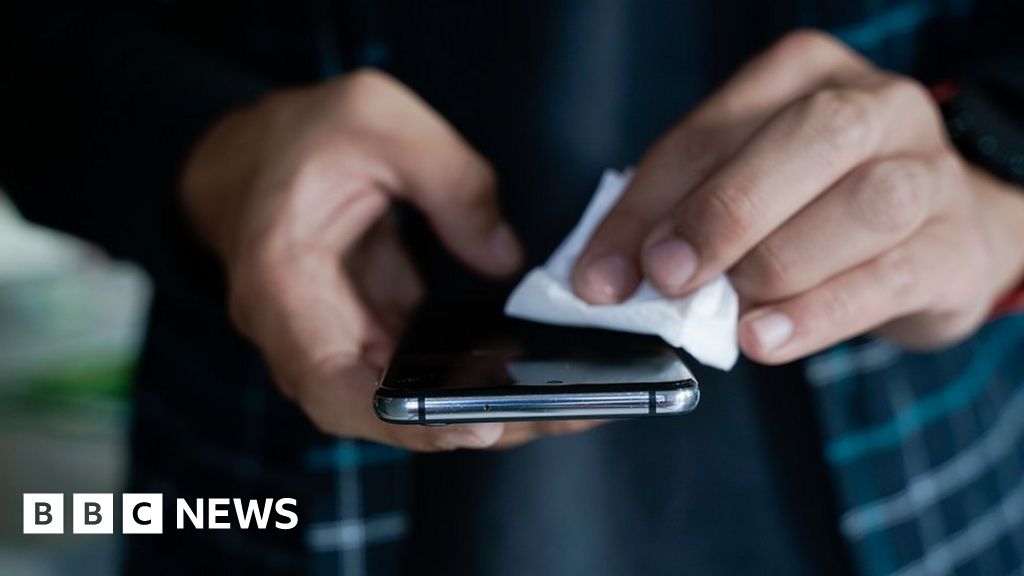You are here
 Covid-19 virus 'survives on some surfaces for 28 days' Researchers find SARS-Cov-2 survives on glass, paper and stainless steel for longer than thought. BBC News
Covid-19 virus 'survives on some surfaces for 28 days' Researchers find SARS-Cov-2 survives on glass, paper and stainless steel for longer than thought. BBC News The virus responsible for Covid-19 can remain infectious on surfaces such as banknotes, phone screens and stainless steel for 28 days, researchers say.
The findings from Australia's national science agency suggest SARS-Cov-2 can survive for far longer than thought.
However, the experiment was conducted in the dark. UV light has already been shown to kill the virus.
Some experts have also thrown doubt on the actual threat posed by surface transmission in real life.
The coronavirus is mostly transmitted when people cough, sneeze or talk.
But there is also evidence that it can also be spread by particles hanging in the air. It is also possible someone could get Covid-19 by touching infected surfaces such as metal or plastic, according to the US Centers for Disease Control. This is believed to be much less common, however....
The study, published in Virology Journal, also found SARS-Cov-2 survived for less time at hotter temperatures than cooler temperatures; it stopped being infectious within 24 hours at 40C on some surfaces. ...
 The effect of temperature on persistence of SARS-CoV-2 on common surfaces The rate at which COVID-19 has spread throughout the globe has been alarming. While the role of fomite transmission is not yet fully understood, precise data on the environmental stability of SARS-CoV-2 is required to determine the risks of fomite transmission from contaminated surfaces. This study measured the survival rates of infectious SARS-CoV-2, suspended in a standard ASTM E2197 matrix, on several common surface types. All experiments were carried out in the dark, to negate any effects of UV light. Inoculated surfaces were incubated at 20 °C, 30 °C and 40 °C and sampled at various time points. Survival rates of SARS-CoV-2 were determined at different temperatures and D-values, Z-values and half-life were calculated. We obtained half lives of between 1.7 and 2.7 days at 20 °C, reducing to a few hours when temperature was elevated to 40 °C. With initial viral loads broadly equivalent to the highest titres excreted by infectious patients, viable virus was isolated for up to 28 days at 20 °C from common surfaces such as glass, stainless steel and both paper and polymer banknotes. Conversely, infectious virus survived less than 24 h at 40 °C on some surfaces. These findings demonstrate SARS-CoV-2 can remain infectious for significantly longer time periods than generally considered possible. These results could be used to inform improved risk mitigation procedures to prevent the fomite spread of COVID-19. Virology Journal
The effect of temperature on persistence of SARS-CoV-2 on common surfaces The rate at which COVID-19 has spread throughout the globe has been alarming. While the role of fomite transmission is not yet fully understood, precise data on the environmental stability of SARS-CoV-2 is required to determine the risks of fomite transmission from contaminated surfaces. This study measured the survival rates of infectious SARS-CoV-2, suspended in a standard ASTM E2197 matrix, on several common surface types. All experiments were carried out in the dark, to negate any effects of UV light. Inoculated surfaces were incubated at 20 °C, 30 °C and 40 °C and sampled at various time points. Survival rates of SARS-CoV-2 were determined at different temperatures and D-values, Z-values and half-life were calculated. We obtained half lives of between 1.7 and 2.7 days at 20 °C, reducing to a few hours when temperature was elevated to 40 °C. With initial viral loads broadly equivalent to the highest titres excreted by infectious patients, viable virus was isolated for up to 28 days at 20 °C from common surfaces such as glass, stainless steel and both paper and polymer banknotes. Conversely, infectious virus survived less than 24 h at 40 °C on some surfaces. These findings demonstrate SARS-CoV-2 can remain infectious for significantly longer time periods than generally considered possible. These results could be used to inform improved risk mitigation procedures to prevent the fomite spread of COVID-19. Virology Journal



Recent Comments